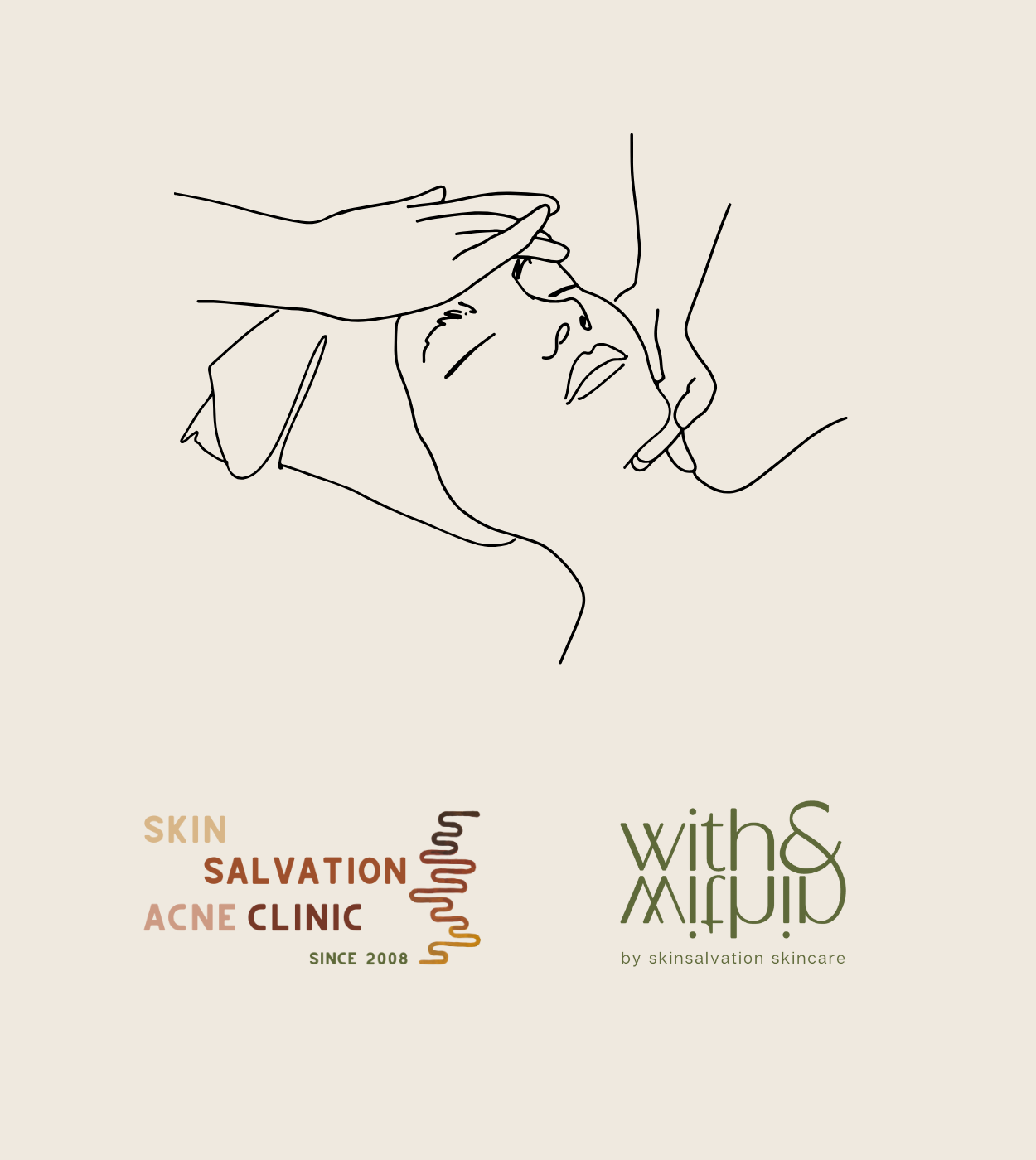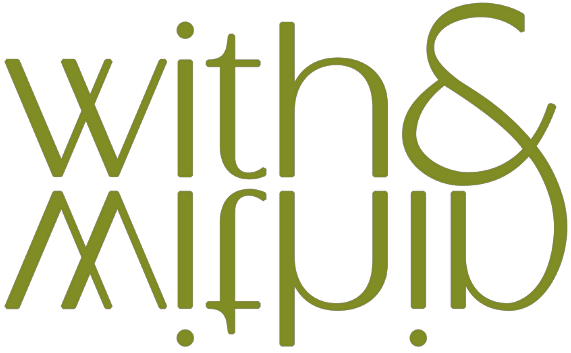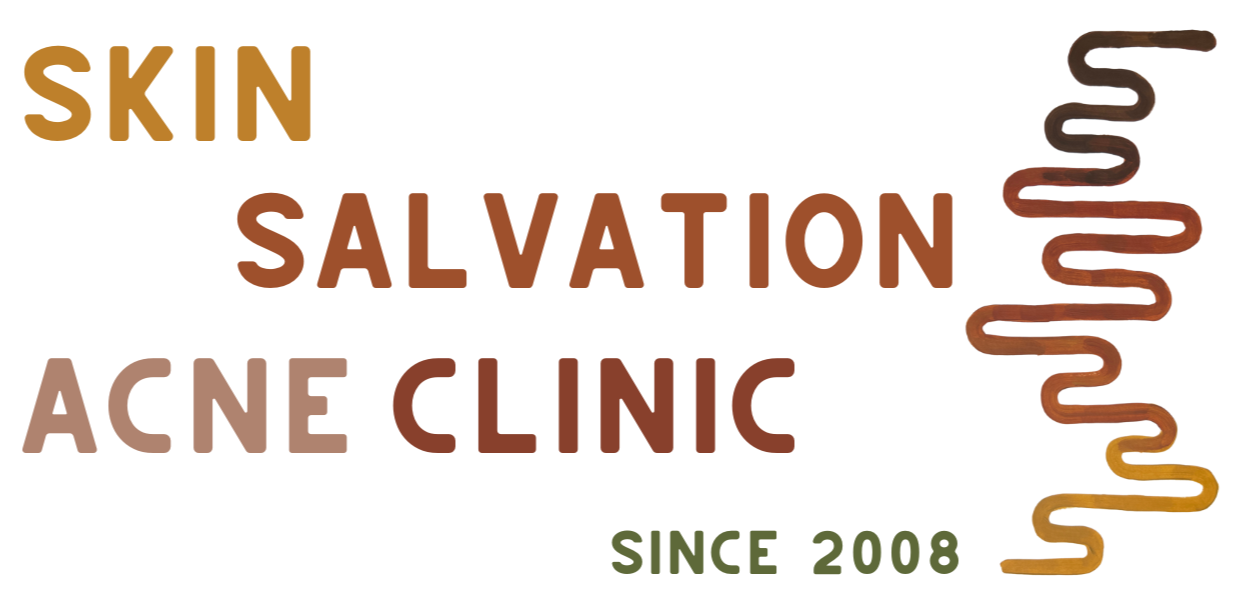
the official sS guide to constipation and acne

 throughout my twenties, i was in a band that toured the country often. i had persistent acne that would not relent despite my efforts to "eat clean" and to pare down my skincare regimen. during this period of my life, i noticed that every time i left town to go on tour, my digestive functions would, without fail, shut down. i found myself going 6, 7, 8 days without...dropping the kids off at the pool. now several years later, i recognize this as extreme constipation in response to the stress of travel, alcohol consumption, disrupted sleep and altered dietary routines. at the time, i couldn't make sense of it all. i mostly just laughed it off as a quirk, not fully comprehending the gravity of constipation as a health condition.
but what exactly is constipation and why am i talking about it on an acne blog? as we've discussed in previous blog posts, digestion plays a crucial role in skin health. if your digestive system is not functioning like a well-oiled machine, other organs, like the skin, usually take up the slack. for those with acne-prone skin, keeping things moving is an essential step on the skin-healing journey.
constipation affects 20% of the american adult population.1 it's a condition that results in a person having "fewer than three bowel movements a week, or hard, dry and small bowel movements that are painful or difficult to pass."2 though we should aim to eliminate 1 to 3 times each day, modern lifestyle factors like stress, poor fiber intake and dehydration can slow down our body processes. healthy bowel transit time should rest anywhere between 12 and 24 hours. an easy way to test for this is to swallow 2 tablespoons of whole white sesame seeds with a meal, record the time and observe when they appear in your stool afterwards.
have you ever taken a moment to really examine the stuff that ends up in the toilet? if not, you're not alone! we are encouraged from an early age to avoid this taboo subject, to replace direct language with euphemisms and flat-out denials, to dance around the doo-doo. many of us are afraid to even admit that we undergo this natural and perfectly healthy daily routine altogether.
throughout my twenties, i was in a band that toured the country often. i had persistent acne that would not relent despite my efforts to "eat clean" and to pare down my skincare regimen. during this period of my life, i noticed that every time i left town to go on tour, my digestive functions would, without fail, shut down. i found myself going 6, 7, 8 days without...dropping the kids off at the pool. now several years later, i recognize this as extreme constipation in response to the stress of travel, alcohol consumption, disrupted sleep and altered dietary routines. at the time, i couldn't make sense of it all. i mostly just laughed it off as a quirk, not fully comprehending the gravity of constipation as a health condition.
but what exactly is constipation and why am i talking about it on an acne blog? as we've discussed in previous blog posts, digestion plays a crucial role in skin health. if your digestive system is not functioning like a well-oiled machine, other organs, like the skin, usually take up the slack. for those with acne-prone skin, keeping things moving is an essential step on the skin-healing journey.
constipation affects 20% of the american adult population.1 it's a condition that results in a person having "fewer than three bowel movements a week, or hard, dry and small bowel movements that are painful or difficult to pass."2 though we should aim to eliminate 1 to 3 times each day, modern lifestyle factors like stress, poor fiber intake and dehydration can slow down our body processes. healthy bowel transit time should rest anywhere between 12 and 24 hours. an easy way to test for this is to swallow 2 tablespoons of whole white sesame seeds with a meal, record the time and observe when they appear in your stool afterwards.
have you ever taken a moment to really examine the stuff that ends up in the toilet? if not, you're not alone! we are encouraged from an early age to avoid this taboo subject, to replace direct language with euphemisms and flat-out denials, to dance around the doo-doo. many of us are afraid to even admit that we undergo this natural and perfectly healthy daily routine altogether.
here at skinSALVATION, we are not afraid to get right to it. if you’re a client, you are probably already familiar with the digestion-acne connection. the main purpose of defecation is to swiftly remove toxins and excess estrogens from the body. when people suffer from constipation, these toxins and hormones get held up at the border and if they are stopped up for too long, they make their way back into the bloodstream. the body then finds alternate ways of pushing them out and the skin becomes the next exit point. the influx of estrogen back into the bloodstream has an additionally negative impact on hormonal balance, which in turn, can contribute to acne.
so how do you know where you stand on the poop spectrum? in the late 90s in bristol, england, some medical researchers generated a genius poo-determination tool called the bristol stool chart. while other healing modalities like chinese medicine and ayurveda had been examining poop characteristics as a means of determining illness in patients for centuries, the bristol stool chart was the first standardized poop test in the west and it has been important in the diagnosis of conditions like irritable bowel syndrome (ibs) and small intestinal bacterial overgrowth (sibo). how does your poop match up? if types 1 or 2 seem all too familiar, it might be time for a re-evaluation. here are some of our favorite tips to combat constipation:
drink more water. this is an easy one. aim to consume at least half your body weight in ounces each day. so if you weigh 160 lbs, try to get at least 80 ounces of water into that beautiful bod to hydrate your cells and to loosen up your stools. carry a large glass or stainless steel water bottle with you and sip from it all day. add tasty accessories to your water to make it more palatable - citrus, cucumber, spearmint and sage work wonders to spruce up some plain old water.
drink herbal tea (these can count toward your total water goal for the day). try drinking teas with digestive herbs after eating in order to lend a helping hand to your overworked digestive organs. look for teas with black pepper, licorice, cardamom, cinnamon, ginger and fennel, all of which beat the bloat while helping to move things along. if your constipation is dire, senna tea can be a temporary solution, but avoid relying on this herb, as it is more of a bandaid that doesn't tackle the root of the problem.
how does your poop match up? if types 1 or 2 seem all too familiar, it might be time for a re-evaluation. here are some of our favorite tips to combat constipation:
drink more water. this is an easy one. aim to consume at least half your body weight in ounces each day. so if you weigh 160 lbs, try to get at least 80 ounces of water into that beautiful bod to hydrate your cells and to loosen up your stools. carry a large glass or stainless steel water bottle with you and sip from it all day. add tasty accessories to your water to make it more palatable - citrus, cucumber, spearmint and sage work wonders to spruce up some plain old water.
drink herbal tea (these can count toward your total water goal for the day). try drinking teas with digestive herbs after eating in order to lend a helping hand to your overworked digestive organs. look for teas with black pepper, licorice, cardamom, cinnamon, ginger and fennel, all of which beat the bloat while helping to move things along. if your constipation is dire, senna tea can be a temporary solution, but avoid relying on this herb, as it is more of a bandaid that doesn't tackle the root of the problem. eat enough fiber - both soluble and insoluble. soluble fiber is the soft stuff that hastens our bowel movements - bananas, the inside of a sweet potato, and the fleshy parts of root vegetables. insoluble fiber consists of fruit and vegetable skins and stalks - all of the roughage that we don't digest and which contributes bulk to our stools. we would be lost without both of these important types of fiber and we should all aim to consume 25-40 grams in total each day.
avoid processed food, dairy and fried foods. these foods can contribute to major backups and often have a dehydrating effect on the body.
take a magnesium supplement like natural calm before bed. not only does magnesium help you drift off into a blissful night's sleep, it is also a crucial mineral for skin health and acts as a mild muscle relaxer. most americans are deficient in this mineral and it is not easily absorbed from food, so taking at least 400 mg each night is advised.3 taking an epsom salt bath is another great way to absorb this precious mineral through the skin. a quality cod liver oil supplement can also help move things along. we like nordic naturals.
keep your stress in check. is there any physical ailment that does not include stress management as a treatment? no! as i parlayed in my story above, the gut-brain connection has a huge impact on our bodily functions. our digestive systems shut down during times of stress as the body funnels its energy to our fight or flight response. eating in a calm environment and practicing stress management techniques daily is essential for keeping constipation at bay. the better we manage stress, the more energy our bodies have to devote to digesting and eliminating our food.
consume prebiotics, probiotics and enzymes. prebiotics are particular foods (artichoke, asparagus, green bananas and plantains, onions, garlic) that are consumed and digested by our good gut flora, while probiotics re-populate our guts with new bacteria. since our stools mostly consist of bacteria, having balanced gut flora is essential. additionally, taking an enzyme before each meal can help our bodies break down proteins, carbohydrates and fats, allowing us to absorb more nutrients from our food. for those suffering from sibo or ibs, be careful with pre and probiotics and talk to your doctor for recommendations.
get into proper squat position when you're ready to release. using a squatty potty or a footstool can make all the difference. it's important to create good bathroom habits - don't rush, always try to relax and try to eliminate at the same times each day.
express yourself. get those emotions out, either by going to therapy, talking to friends or by starting a daily journaling practice. your body's physical need to hold onto matter within its walls often reflects a psychological need to hold onto habits or emotions that no longer serve you. instead of bottling up your emotions, let them out in positive and healthy ways. this release can be illuminating in more ways than one!
move and stretch. yoga and gentle exercise are fantastic ways to get things moving downtown. try wind-relieving pose, child's pose, downward dog, supine twist and forward fold - these twisty yoga poses can all help relieve constipation and encourage movement.
constipation is a serious issue. it means that something is out of balance internally, either with digestion, stress or hormones. so if you find yourself unable to eliminate for several days in a row, seek professional medical advice.
eat enough fiber - both soluble and insoluble. soluble fiber is the soft stuff that hastens our bowel movements - bananas, the inside of a sweet potato, and the fleshy parts of root vegetables. insoluble fiber consists of fruit and vegetable skins and stalks - all of the roughage that we don't digest and which contributes bulk to our stools. we would be lost without both of these important types of fiber and we should all aim to consume 25-40 grams in total each day.
avoid processed food, dairy and fried foods. these foods can contribute to major backups and often have a dehydrating effect on the body.
take a magnesium supplement like natural calm before bed. not only does magnesium help you drift off into a blissful night's sleep, it is also a crucial mineral for skin health and acts as a mild muscle relaxer. most americans are deficient in this mineral and it is not easily absorbed from food, so taking at least 400 mg each night is advised.3 taking an epsom salt bath is another great way to absorb this precious mineral through the skin. a quality cod liver oil supplement can also help move things along. we like nordic naturals.
keep your stress in check. is there any physical ailment that does not include stress management as a treatment? no! as i parlayed in my story above, the gut-brain connection has a huge impact on our bodily functions. our digestive systems shut down during times of stress as the body funnels its energy to our fight or flight response. eating in a calm environment and practicing stress management techniques daily is essential for keeping constipation at bay. the better we manage stress, the more energy our bodies have to devote to digesting and eliminating our food.
consume prebiotics, probiotics and enzymes. prebiotics are particular foods (artichoke, asparagus, green bananas and plantains, onions, garlic) that are consumed and digested by our good gut flora, while probiotics re-populate our guts with new bacteria. since our stools mostly consist of bacteria, having balanced gut flora is essential. additionally, taking an enzyme before each meal can help our bodies break down proteins, carbohydrates and fats, allowing us to absorb more nutrients from our food. for those suffering from sibo or ibs, be careful with pre and probiotics and talk to your doctor for recommendations.
get into proper squat position when you're ready to release. using a squatty potty or a footstool can make all the difference. it's important to create good bathroom habits - don't rush, always try to relax and try to eliminate at the same times each day.
express yourself. get those emotions out, either by going to therapy, talking to friends or by starting a daily journaling practice. your body's physical need to hold onto matter within its walls often reflects a psychological need to hold onto habits or emotions that no longer serve you. instead of bottling up your emotions, let them out in positive and healthy ways. this release can be illuminating in more ways than one!
move and stretch. yoga and gentle exercise are fantastic ways to get things moving downtown. try wind-relieving pose, child's pose, downward dog, supine twist and forward fold - these twisty yoga poses can all help relieve constipation and encourage movement.
constipation is a serious issue. it means that something is out of balance internally, either with digestion, stress or hormones. so if you find yourself unable to eliminate for several days in a row, seek professional medical advice.





